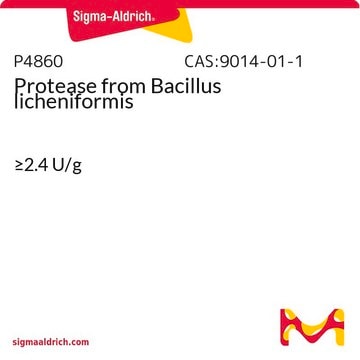C4018
Choloylglycine Hydrolase from Clostridium perfringens (C. welchii)
lyophilized powder, ≥100 units/mg protein
Synonym(s):
3α,7α,12α-Trihydroxy-5β-cholan-24-oylglycine amidohydrolase
Sign Into View Organizational & Contract Pricing
All Photos(3)
About This Item
CAS Number:
MDL number:
UNSPSC Code:
12352204
NACRES:
NA.54
Recommended Products
form
lyophilized powder
specific activity
≥100 units/mg protein
composition
Protein, ≥50% biuret
shipped in
wet ice
storage temp.
−20°C
Looking for similar products? Visit Product Comparison Guide
Application
The enzyme from Sigma has been used in the analysis of bile samples in various studies.
Biochem/physiol Actions
The enzyme is an N-terminal nucleophilic (Ntn) hydrolase that catalyzes the hydrolysis of amide bonds, liberates the glycine/taurine moiety from the steroid core and eventually yields unconjugated bile acids. Agents that oxidize thiol groups (e.g., p-mercuribenzoate, iodoacetamide, Hg2+, Cu2+, and Cd2+) have been shown to strongly inhibit bile salt hydrolase (BSH) activity in Clostridium perfringens.
Unit Definition
One unit will hydrolyze 1.0 μmole of glycocholic acid to glycine and cholic acid in 5 min at pH 5.6 at 37 °C.
Physical form
Partially purified lyophilized powder containing buffer salts and stabilizer
Signal Word
Danger
Hazard Statements
Precautionary Statements
Hazard Classifications
Resp. Sens. 1
Storage Class Code
11 - Combustible Solids
WGK
WGK 1
Flash Point(F)
Not applicable
Flash Point(C)
Not applicable
Personal Protective Equipment
dust mask type N95 (US), Eyeshields, Gloves
Certificates of Analysis (COA)
Search for Certificates of Analysis (COA) by entering the products Lot/Batch Number. Lot and Batch Numbers can be found on a product’s label following the words ‘Lot’ or ‘Batch’.
Already Own This Product?
Find documentation for the products that you have recently purchased in the Document Library.
Maksim Rossocha et al.
Biochemistry, 44(15), 5739-5748 (2005-04-13)
Bacterial bile salt hydrolases catalyze the degradation of conjugated bile acids in the mammalian gut. The crystal structures of conjugated bile acid hydrolase (CBAH) from Clostridium perfringens as apoenzyme and in complex with taurodeoxycholate that was hydrolyzed to the reaction
Akira Honda et al.
Journal of lipid research, 46(2), 287-296 (2004-12-04)
Cerebrotendinous xanthomatosis (CTX), sterol 27-hydroxylase (CYP27A1) deficiency, is associated with markedly reduced chenodeoxycholic acid (CDCA), the most powerful activating ligand for farnesoid X receptor (FXR). We investigated the effects of reduced CDCA on FXR target genes in humans. Liver specimens
Younghoon Kim et al.
Bioscience, biotechnology, and biochemistry, 72(6), 1483-1490 (2008-06-10)
This study characterizes the factors responsible for the cholesterol reduction by Lactobacillus acidophilus ATCC 43121. In addition, two-dimensional gel electrophoresis (2-DE) and protein profiling was also used to study the response of ATCC 43121 at the proteome level in the
Effects of Quercetin and Rutin on Serum and Hepatic Lipid Concentrations, Fecal Steroid Excretion and Serum Antioxidant Properties
Nakamura Y, et al.
Journal of Health Science, 46(4), 229-240 (2000)
Bile salt hydrolase activity in probiotics.
Máire Begley et al.
Applied and environmental microbiology, 72(3), 1729-1738 (2006-03-07)
Our team of scientists has experience in all areas of research including Life Science, Material Science, Chemical Synthesis, Chromatography, Analytical and many others.
Contact Technical Service









